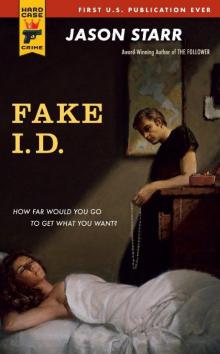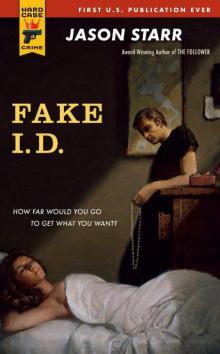- Home
- Jason Starr
The Pack Page 2
The Pack Read online
Page 2
Tom was sitting at his desk. Simon was so upset he was actually shaking.
“You shouldn’t be in here,” Tom said.
“Are you kidding me?” Simon said. “What the hell is going on here? Come on, just talk to me.”
Tom took a deep breath, then said reluctantly, “Look, you know how it is these days. It’s a numbers game, pure and simple.”
“But at that performance review two weeks ago you said I’m doing an excellent job. Those were your exact words—‘You’re doing an excellent job, Simon.’ ”
Joe rushed into the office and said, “You’re going to have to leave this office now, Mr. Burns.”
“Mr. Burns?” Simon said to Joe. “Did you seriously just call me Mr. Burns?”
“Do what he says,” Tom said.
“Come on, I’m begging you,” Simon said to Tom. “I have a wife and a kid, and we have to pay a mortgage and maintenance and child care and—”
“I’m serious,” Joe said. “You’re not allowed to have this discussion.”
“Why me?” Simon continued to Tom. “Why not somebody else? I mean Paul’s been here, what, a year? Why not fire him?”
“This could affect your severance,” Joe said.
“I mean you don’t even talk to me?” Simon was getting angrier, raising his voice. “You don’t even give me a chance to defend myself? After seven years? Seven goddamn years?”
“I’m sorry, Simon,” Tom said.
“Please don’t speak to him,” Joe said to Tom.
“Oh, you’re sorry,” Simon said.“Oh, well, that makes things so much better. Tell me, tell me, tell me this.” Simon knew he was losing control, but he kept going. “When did I ever, in seven years, when did I ever not deliver for you? Every project I’ve gotten to you on time, I’ve never missed a meeting. The only time I took a sick day in seven years was when my son had the goddamn swine flu.”
“If you don’t leave right now,” Joe said to Simon, “I’ll have to write this up.”
“Look me in the eye,” Simon said to Tom. “Look me in the eye and tell me you didn’t have anything to do with this decision.”
Tom’s eyes shifted away, toward his computer monitor.
“Unbelievable,” Simon said and marched out. He slammed the door for effect and the whole flimsy wall shook and he heard something in the office fall and glass shatter. He made it about halfway back to his desk, feeling dazed and numb, then turned and rushed back into Tom’s office and said, “I’m sorry. I—I didn’t mean to do that.”
Now Tom looked pissed off, as he was bending over the broken picture frame, starting to pick up the biggest pieces of glass. He said, “Just go, Simon. It’s over, okay?”
A heavyset security guard had entered the office and was standing next to Joe.
“I’m sorry,” Joe said to Simon, “but you need to pack up your personal items and leave the building right away. Kevin will give you a hand.”
Simon stood there for several seconds, feeling numb, and then he walked away. People in the office had stopped what they were doing, peering over their cubicles or looking up from their desks. Still in a fog, feeling like he was half there, Simon ignored everyone. Somehow he wound up in his office, packing a box with stuff as the security guard lingered near the door, but he didn’t remember getting the box and he was barely aware of anything he was doing. At one point, Mark came over and said, “Hey, I’m really sorry, man,” but Simon didn’t answer him or even look over.
As he finished packing, the shock of being fired was starting to fade, and the anger was hitting full force. This was such total crap. He wasn’t just some part-time employee or temp. He’d put in seven years of his life working for S&O, and this was how it was ending? What had Tom said, We’re going to have to eliminate your position? Have to, like it was ordained from God or something. After all these years, couldn’t Tom at least have given him a heads-up, any kind of hint that this was coming down the pike? But, no,Tom hadn’t said a word to him, though—Simon suddenly realized—there had been a few clues. Like that staff meeting two weeks ago Tom “forgot” to tell him about, or what about that time—when was it, late last week?—when Simon got on the elevator with Tom and Eric, one of the creative directors, and their conversation suddenly stopped? The more Simon thought about it, the more he realized there had been little, subtle clues all along, and maybe if he hadn’t been so stressed out at work, and with his whole crazy schedule, he could’ve put the pieces of the puzzle together sooner and realized his job was in jeopardy.
Still, it was so spineless of Tom to just spring this on him.Yeah, like Simon was really supposed to believe that Tom’s hands had been tied on this, that Tom had stood up for him with Andy Wallace and the other guys in management? If Andy had suggested letting Simon go,Tom had probably acquiesced right away. Or, more likely, it had been Tom’s idea. Simon could imagine it so clearly now—Andy meeting with Tom and asking for a suggestion for who to let go—Paul or Simon—and Tom saying, “I think we should fire Simon.”
Simon wished there were something he could do—go over Tom’s head, file some kind of grievance—but he knew that whining about the situation would get him nowhere. People got fired all the time in advertising; it was par for the course. He’d been fortunate that, up until today, it had never happened to him. But it had definitely been a mistake slamming the door to Tom’s office and breaking that picture frame. After all, he might need a recommendation.
Leaving the office was one of the most humiliating experiences of Simon’s life. Although he didn’t see anyone watching him, he knew everyone was watching him. This would be the highlight of their day—hell, their week. They’d tell their spouses and friends about how Simon Burns had been fired today and how he’d slammed his boss’s door and broken a picture frame. Simon just wanted to get the hell out of there as fast as possible, but it seemed like it took minutes to get from his office to the elevators. He was trying to focus straight ahead and to be Zen, in the moment, but it was impossible to block out his thoughts. This was the first time he’d been fired from any job, he suddenly realized, and he was completely unprepared for the wild rush of emotions. He felt embarrassed, ashamed, like a total failure. He was also terrified, knowing there was no way he could pay the bills with some flimsy unemployment check. The job market was so tough there was no guarantee he could find a job this year, and he was going to have to burn through his savings just to pay the rent.
Walking up Broadway, Simon stepped off a curb when a traffic light had turned to DON’T WALK and a speeding cab almost hit him. He barely cared, though, as he continued uptown in a daze, feeling like his whole life had gone to hell.
TWO
Alison took the news much better than Simon had expected. He didn’t want to break it to her over the phone, so he told her in person, when she got home from work and after Margaret left. At first she was upset and angry, calling Tom names and commiserating about how unfair it all was, especially the way it had gone down, but then she said, “You know, maybe this isn’t such a bad thing.”
She was on the couch and Simon was pacing. Jeremy was in his room playing with his train set.
“How isn’t it bad?” Simon said. “We were barely getting by on two salaries and now we have one, and in this economy it could take months or longer before I find another job.”
“Maybe you don’t have to find a job,” Alison said.
Simon stopped pacing and said,“You’re kidding, right?” He knew she wasn’t, so he continued,“How are we supposed to survive? Have you seen the bills lately? We can use my severance to pay off the credit card bills, it’ll barely cover that, and then what? The mortgage is thirty-two hundred a month alone, then there’s the maintenance, the bills, Margaret’s salary—”
“We can fire Margaret,” Alison said.
Now Simon knew what Alison was getting at. He said, “And how are we supposed to afford that? We were barely getting by on two salaries. All we’ll have is your salary and my unempl
oyment, and remember unemployment’s taxable.”
“We can cut back on expenses,” Alison said. “Eat at home more, get rid of the premium cable channels, shop in bulk at Costco, not run the AC as much in the summer. If we cut corners and put our minds to it, I bet we can save five hundred bucks a month, easy.”
“Five hundred dollars won’t make a dent,” Simon said.
“Maybe we can save a thousand,” Alison said. “We can take more subways and buses, and I’ll stop splurging on massages. I can even start buying my makeup at Rite Aid instead of Sephora.”
“I still don’t think the numbers are going to work out,” Simon said.
“Okay, so maybe we’ll have to dig into our savings for a while until we figure out how to get by. But I don’t think we’ll have to dig in as much as we think. And if we don’t contribute to our Roths this year, we’ll be able to replenish some of the money.”
“Yeah, and what am I supposed to do?” Simon said. “Be a stay-at-home dad for the rest of my life?”
“Not the rest of your life,” Alison said. “You can keep looking for work, but in a worst-case scenario, if you don’t work for a year, maybe two years, until Jeremy starts kindergarten, it wouldn’t be such a bad thing. Maybe you can do some freelancing, consulting from home, and meanwhile at least one of us would be with Jeremy during the day—that’s the most important thing, right?”
Simon had to admit the idea made sense. Alison was doing well at her job, making a decent salary, and they could go on her health insurance. Besides, at least for right now, they didn’t have any choice. Since Simon didn’t have a current résumé ready it would probably be weeks before he could even start interviewing.
“I don’t know,” Simon said,“can you really see me as a stay-at-home dad?”
“A lot of men do it,” Alison said. “My friend Julie’s husband, Ron, stays home with his kids in Westchester, and I know a few people on Facebook whose husbands don’t work. People have to do whatever they can these days to get by.”
“But are you going to be happy?” Simon asked.
“I’ll be happier than I am now,” Alison said. “I mean, of course I’ll wish I were the one staying home with him, but I’ll get used to it, and I think it’ll be better for us too. You’ve been so stressed out at work lately, it hasn’t been great for the marriage. Maybe a break from working will help with everything, you know?”
Simon didn’t like how she was vaguely blaming him for their marriage problems, but he didn’t want to make an issue of this. If anything, it was a subject to possibly bring up during the next session with Dr. Hagan.
“Okay, I’m willing to give it a shot,” he said.
For the rest of the evening, Alison seemed excited about the new plan, going on about the new schedule and suggestions of playgrounds, potential play dates, and free events around the city for Simon to take Jeremy to. Though Simon could understand why Alison thought it was great that Jeremy could be raised by one of his parents, he wasn’t quite as giddy about it as she was. After all, today had been one of the worst days of his life. He’d been fired from his job and there was suddenly a dark cloud over his whole career. He didn’t want a sympathy party, but a little sympathy would have been nice.
They did their nightly routine—Alison got Jeremy ready for bed and then Simon read him a bedtime story. When Jeremy fell asleep, Simon went down the hall to the master bedroom and saw Alison in bed using her laptop.
“There’s so much for you guys to do around the city,” she said, still in an upbeat mood. “I’m e-mailing you a whole list of things to do. This is going to be so great.You two are going to have such a great time together.”
Simon went into the kitchen and poured a glass of Chardonnay from an open bottle in the fridge. He was hoping the wine would calm him down, help put this nightmare day behind him, but he was still tense when he returned to the living room. He turned on the TV—maybe to Comedy Central—and eventually fell asleep.
In the morning Simon had to fire Margaret. Alison had suggested calling her before she left her apartment in Queens, but Simon felt that would’ve been too harsh. Margaret had been Jeremy’s babysitter for almost two years, and he felt she deserved to get the news in person.
Before Margaret arrived, Alison took Jeremy for a walk in his stroller so there would be less drama.
Margaret seemed to know something was wrong when she recognized the silence in the apartment and asked, “Where’s Jeremy?”
Deciding not to beat around the bush, Simon said, “I’m sorry, we have to let you go.”
He explained the situation—how he’d been fired himself yesterday and they simply couldn’t afford to pay for a babysitter.
Margaret was teary eyed.
“Believe me, I know exactly what you’re going through,” Simon said. “I know a lot of people say that in these situations, but in this case it’s true.”
“I understand,” Margaret said. “Where’s Jeremy?”
“We thought it would be best if he wasn’t here. But you can talk to him on the phone later and we’d love to have you over sometime for dinner.”
“Thank you,” Margaret said, “that would be nice.”
She was taking the news with dignity; he had to give her that. She wasn’t slamming doors and breaking picture frames.
When Margaret left, Simon paced the apartment. At first he was feeling bad for having to say good-bye to Margaret, who had become a part of their family, but then the sour feeling morphed into feeling bad about the way his job had ended. Yes, Tom had totally blindsided him and there had been a lot of hidden agendas and political backstabbing going on, but it had been a big mistake to leave the office the way he had. He felt humiliated, like he’d made a big fool of himself.
He opened his laptop and typed:Dear Tom,
I want to apologize for the way things went down yesterday. The whole situation caught me off guard. I was in shock and wasn’t really aware of my behavior. Obviously I regret my reaction and I’d be happy to pay to get the picture frame repaired. I’m still pretty shocked and upset, of course, but I understand that business is business and I hope we can make the best of a bad situation. How about we grab lunch or a drink, maybe next week sometime, and talk this thing through in person?
Sorry again about yesterday and looking forward to meeting up soon.
All best,
Simon
Simon read the note several times and thought he’d achieved the perfect tone. He liked that the note was respectful and apologetic, but not wimpy—a tough line to toe. He only made one change—“Dear Tom” to “Hi, Tom,” going for a more friendly, casual opening. He read it again, liking it even more, then clicked send. He hoped the message would help mend fences with Tom or at least start a dialogue. The advertising world in Manhattan was a fishbowl, and the last thing that Simon needed was for word to get around that he was a troublemaker and that he’d left his job at S&O on bad terms.
Alison and Jeremy returned from their walk.
“Where’s Margaret?” Jeremy asked.
He was a smart kid and noticed the major change in his daily routine.
Alison could probably tell how uncomfortable Simon was about breaking the news, so she jumped in and said, “Margaret’s not going to be with you during the day. From now on Daddy’s going to be with you during the day.”
That was when the all-out fit started. Crying quickly evolved into uncontrollable wailing, kicking, and arm flailing. Alison had to get ready to go to work, and when she returned from the bedroom in a black designer suit and heels, her hair in a neat bun, pulling along a small suitcase with product samples, the fit was still going strong.
“I’m in a huge rush,” she said to Simon at the door. “I have a meeting in fifteen minutes on Sixty-fourth and Mad and I can’t be late. Ugh, sorry to leave you like this, but this just confirms we made the right decision—he was getting way too attached to her.” She gave him a peck on the lips. “Call me later and let me know how th
e day is going. Good luck.”
She left, and with a hysterical three-year-old in his arms, it suddenly hit Simon that this was his life now—he was officially a stay-at-home dad.
Simon tried to calm Jeremy with distractions. He suggested playing with books and games on his LeapFrog, but even an attempted bribe of Häagen-Dazs Amazon Valley Chocolate didn’t work. There was just no reasoning with an out-of-control three-year-old. If the twos were terrible, then the threes were psychotic. If anything, Jeremy was getting more hysterical. All kids master the precise tone and level of screaming to drive their parents insane, and Jeremy was no exception. He’d always been a loud child—when he was born he was the loudest baby in the nursery—but now that he was a toddler his screaming was especially piercing and grating, at least to Simon’s ears. Figuring some fresh air might help, Simon put him in his stroller—well, tried to. Jeremy, carrying on so badly he was virtually unreachable, kept arching his back and wouldn’t let Simon strap him in. Although Simon was trying to stay in control, he realized he was screaming at his son.Then, deciding he’d had enough of this crap, he picked up the screeching kid in one hand and the stroller in the other and left the apartment.
Simon carried his hysterical son for three blocks. At Eighty-sixth Street, Jeremy was so exhausted from the fit that he finally went into his stroller. Simon was tired too and wished someone would wheel him around the city all day.
They went to the playground in Central Park at Eighty-first Street and Central Park West. Simon had been to this playground many times on Saturdays and Sundays, but it had a much different vibe during the week. On weekends there were lots of moms and dads, but now, he suddenly realized, he was the only guy there. There were a few moms, talking amongst themselves, and mostly foreign-looking babysitters.
Simon had thought Jeremy was wiped out and would play calmly the rest of the morning, but it turned out his calmness was a ruse and he was actually conserving his energy. When Simon told him it was time to get out of his stroller, fit number two promptly began. He refused to budge and started screaming at the top of his lungs for Margaret. Simon got sympathetic looks from moms and babysitters, but he knew they were all thinking, Look at that pathetic guy, he has no idea what he’s doing.

 Too Far
Too Far Ant-Man
Ant-Man Fake I.D.
Fake I.D. The Pack
The Pack Fugitive Red
Fugitive Red Tough Luck
Tough Luck The Follower
The Follower Cold Caller
Cold Caller Savage Lane
Savage Lane Gotham
Gotham Hard Feelings: A Novel
Hard Feelings: A Novel The Craving
The Craving 12 Ant-Man Natural Enemy
12 Ant-Man Natural Enemy Twisted City
Twisted City Fake I.D. hcc-56
Fake I.D. hcc-56 The Bully
The Bully Panic Attack
Panic Attack